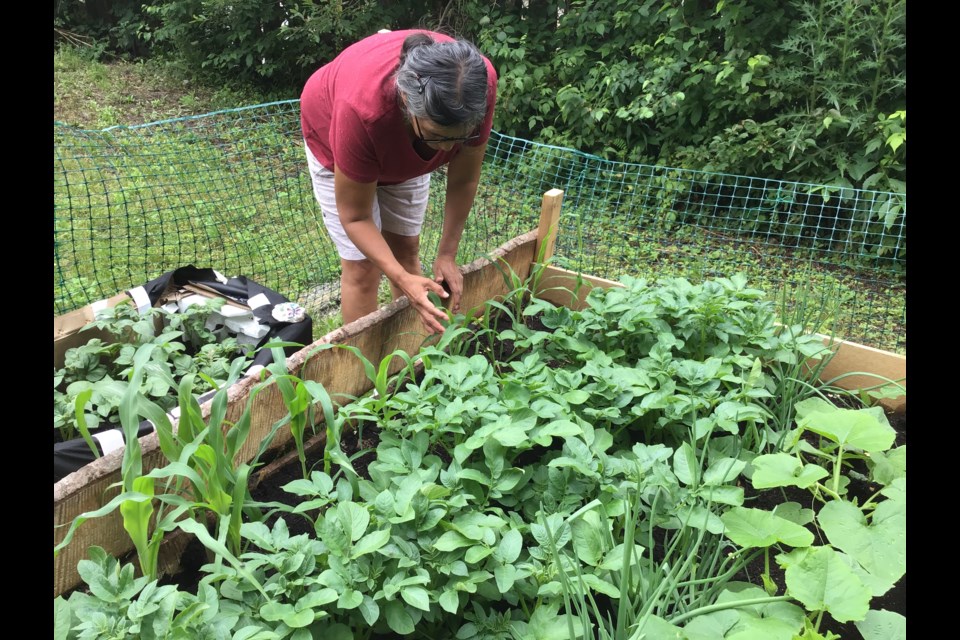Attawapiskat’s Jackie Hookimaw-Witt has started a pilot gardening project to show community members sustainable ways of eating healthy and having their own source of food.
Hookimaw-Witt, who currently lives in North Bay, started a food sovereignty project this summer.
“I want to show them healthy eating because so many of our people’s lives are impacted by diabetes and heart attacks,” she said.
As a chef, Hookimaw-Witt says she wants to work with fresh ingredients and herbs. When she was travelling in Europe, she came across a Switzerland human rights organization, Incomindios, that gave her the grant for the project.
The grant allowed her to buy supplies to learn how to garden and to ship some seeds, pop soil, fertilizers and sheep manure to Attawapiskat.
Originally, Hookimaw-Witt planned to train six people. Because of the gathering restrictions in the community, only her family is currently involved in the project.
“COVID represents a lot of things like food insecurity," she said. "What if there's a crisis, we still need to be able to have sources where we grow food, that we're not dependent on resources that come from outside. We need to be more also self-sufficient."
Hookimaw-Witt said she convinced her nephew, brother and sister, to start gardening.
Through emails and video clips, she showed them how to build a raised bed and how to plant. Her brother also remembered how to plant because their father, who was trained by missionaries, used to garden.
Hookimaw-Witt's family has planted potatoes, onions and carrots and they’re watering fruit bushes that Hookimaw-Witt has sent them. She is also going to dehydrate some herbs and send them up north.
She plans to have a fundraiser for a communal garden nursery in Attawapiskat that will help with growing certain vegetables needing extra care like corn and tomatoes. Hookimaw-Witt also wants to do cooking webinars in the fall and do another in-person project next year.
"Because I think people want you to be there to show how it's done. And then it makes it easier," she said.
Hookimaw-Witt was educating herself how to garden online before she asked her friend, who’s from Turkey and has been doing horticulture for about 20 years, to train her. The friend showed her how to grow onions, zucchinis, fava beans, squash, pumpkin, beets, corn and how to bring tomatoes back to life. She also learned how to use bone meal and organic fertilizers.
“Like us, human beings, we need nutrients to grow and thrive. It’s the same with plants,” Hookimaw-Witt reflects.
Up north, there are lots of possibilities, Hookimaw-Witt said. In Attawapiskat, where hunting and gathering are common, using fish and animal bones can come in handy and help cut down the shipping costs.
Hookimaw-Witt uses a Three Sisters gardening method to grow corn, squash and beans. In her garden, she also has peppers, tomatoes, beets, potatoes, some herbs as well as flowers to attract pollinators.
She has special memories of Potato Island where her father and uncles grew vegetables. In harvest time, her mom, sisters and nephews would go over to help harvest the potatoes, onions, carrots and cabbage.
“I saw my dad in a different way. He was loose, and they were always laughing. And when they had food ready, they were so relaxed lying on the ground and just eating slowly and laughing,” she recalled.
About a month ago, she taught her niece's twins, Reba and Nora, how to plant onions, potatoes, pumpkin, squash and corn. The eight-year-old twins were excited and fascinated with how things grow, Hookimaw-Witt said.
Gardening brings joy and healing to her.
“It’s like I’m growing myself spiritually, physically, emotionally and socially,” she said. “And sometimes I get emotional because I'm remembering my own family back home, my own grannies that I sat around with, heard their stories. Sometimes when I'm crawling around, I'm crying. That's why I mean that it's healing because you’re remembering and you shed your tears and it helps to let your tears flow to the soil.”



